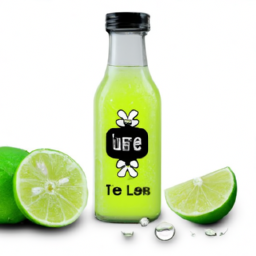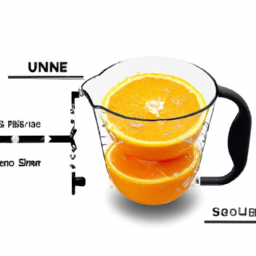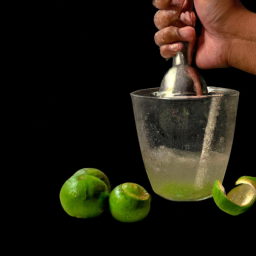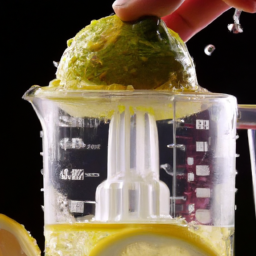As a nutrition specialist, I often receive questions about the acidity levels in various foods and beverages. One common inquiry I receive is about the acidity of orange juice – is it as acidic as people think? The answer may surprise you.
Acidity is a measure of the concentration of hydrogen ions in a substance. The pH scale, which ranges from 0 to 14, is used to measure acidity, with lower numbers indicating higher acidity.
Orange juice, like many fruits, is naturally acidic due to the presence of citric acid. However, the level of acidity can vary depending on factors such as the ripeness of the fruit and the processing methods used to make the juice.
In this article, I will explore the acidity of orange juice in more detail and discuss its effects on the body.
Key Takeaways
- Orange juice is naturally acidic due to citric acid, with an average pH of around 3.5.
- Excessive consumption of orange juice can lead to tooth decay and health problems, while adequate intake provides vitamin C and antioxidants that may reduce chronic disease risk.
- Understanding acidity is important for determining quality and taste of orange juice, and tips for reducing acidity include adding baking soda, sugar, or salt.
- Other considerations include potential allergic reactions, medication interactions, and sugar content, making moderation important for those with diabetes.
Understanding Acidity
You might be wondering, "How acidic is orange juice?"Well, let me tell you – understanding acidity is like taking a journey through a sour, tangy world where every substance has its own unique pH level.
The pH scale, which ranges from 0 to 14, is used to measure the acidity or alkalinity of a substance. A pH of 7 is considered neutral, while anything below 7 is acidic, and anything above 7 is alkaline.
Neutralizing acidity is a crucial aspect of cooking. For instance, when making tomato sauce, adding a pinch of sugar neutralizes the acidity and gives a well-rounded flavor. Similarly, when preparing meat, marinating it in an acidic solution like vinegar or lemon juice breaks down the proteins and makes it more tender.
Understanding acidity is not only important for cooking but also for determining the quality of a drink like orange juice. Measuring the acidity of orange juice can help us better understand its taste and nutritional value.
Measuring the Acidity of Orange Juice
To measure the acidity of orange juice, there are a few methods that can be used. One common technique is titration, where a solution of known concentration is added to the juice until the acid is neutralized.
Another method is using a pH meter, which measures the concentration of hydrogen ions in the juice.
Finally, litmus paper can also be used to determine the acidity of the juice by changing color depending on the pH level.
Adjust the paragraph structure in the Input to logically group complete sentences on their own lines, with a double new line after. Use contractions.
Titration
Titration is a method used to determine the acidity of orange juice. This process involves adding a solution of known concentration, called the titrant, to the orange juice until a chemical reaction occurs. The point at which the reaction is complete is called the endpoint, and it is determined by using an acid-base indicator. The indicator changes color when the acidic orange juice is neutralized by the basic titrant, indicating the endpoint has been reached. By measuring the volume of the titrant used and the concentration of the titrant, the acidity of the orange juice can be calculated.
To better understand the titration process, here is a table showing the steps involved in determining the acidity of orange juice using titration:
| Step | Process | Equipment |
|---|---|---|
| 1. | Prepare the titrant solution of known concentration. | Volumetric flask, balance, deionized water, titrant chemical |
| 2. | Measure a sample of orange juice. | Pipette, Erlenmeyer flask |
| 3. | Add a few drops of an acid-base indicator to the orange juice. | Dropper |
| 4. | Slowly add the titrant solution to the orange juice until the indicator changes color. | Burette |
| 5. | Record the volume of titrant used. | Burette |
Next, we will explore another method for measuring the acidity of orange juice – the pH meter.
pH Meter
Get ready to learn about a tool that’ll make measuring the acidity of your favorite citrus beverage a breeze – the pH meter!
Unlike titration, which requires the use of chemical indicators, a pH meter uses an electrode to measure the concentration of hydrogen ions, determining the acidity of a solution. The electrode has a glass bulb that contains a reference electrode, as well as a sensitive electrode that measures the pH of the solution.
Before using a pH meter, it’s important to calibrate it to ensure accuracy and precision. This involves using buffers with known pH values to adjust the meter accordingly.
Precision is crucial when measuring the acidity of orange juice, as even a small difference in pH can greatly affect the taste and quality of the juice. With the use of a pH meter, however, measuring the acidity of orange juice can be done with ease and accuracy.
Now, let’s move on to the next section about litmus paper, which is another tool that can be used to measure the acidity of a solution.
Litmus Paper
Now you’re in for a treat as we explore a colorful and simple tool for measuring the acidity of various liquids – litmus paper! This pH testing method involves dipping a small strip of paper into a liquid sample and observing the subsequent color changes. The colors seen on the litmus paper indicate the pH level of the liquid being tested.
Here are five key facts about litmus paper:
-
Litmus paper comes in two colors: red and blue. Red litmus paper turns blue in basic solutions (pH over 7), while blue litmus paper turns red in acidic solutions (pH under 7).
-
Litmus paper is a widely used testing method because it’s inexpensive, easy to use, and yields quick results.
-
However, litmus paper is less precise than other pH testing methods like a pH meter, and can only measure a range of pH levels (usually between 4-9).
-
Litmus paper can be used to test a variety of liquids, including urine, saliva, and even soil.
-
Finally, litmus paper isn’t just a tool for measuring pH levels! It’s also used in chemistry experiments to differentiate between acids and bases.
In the next section, we’ll take a look at the results of acidic testing and see just how acidic orange juice really is!
Results of Acidic Testing
I’ve conducted tests to measure the acidity of orange juice. The average pH of the juice was found to be 3.5. This pH level is comparable to other acidic beverages, such as lemonade and soda.
Through these tests, it’s evident that orange juice can be classified as an acidic beverage.
Average pH of Orange Juice
You’ll be surprised to know that the average pH of orange juice is around 3.5, making it quite acidic. As a result of its acidity levels, orange juice provides a range of health benefits, including improved digestion, immune system boost, and reduced risk of chronic diseases.
Here are some key points to keep in mind about the pH levels of orange juice:
-
The pH scale ranges from 0 to 14, with values below 7 being acidic, while those above 7 are alkaline.
-
Orange juice is classified as a weak acid, with a pH value ranging from 3.3 to 4.2.
-
The pH of orange juice can vary depending on several factors, such as the type of orange variety, ripeness, and processing methods.
-
While orange juice is considered acidic, it’s still less acidic than other citrus juices, such as grapefruit and lemon juice.
Despite being acidic, orange juice remains a popular beverage worldwide, thanks to its refreshing taste and numerous health benefits.
In the next section, we’ll compare the pH levels of orange juice to other popular beverages and see how it stacks up.
Comparison to Other Beverages
If you’ve ever wondered how your favorite beverages compare in terms of pH levels, it may surprise you to know that some of the most popular drinks are highly acidic. In fact, orange juice is considered to be one of the more acidic fruit juices, with an average pH of around 3.5. However, when compared to other common beverages, such as soda, energy drinks, and sports drinks, orange juice is actually on the lower end of the pH scale.
To provide a comparative analysis, here is a table showing the pH levels of various beverages:
| Beverage | pH Level |
|---|---|
| Orange Juice | 3.5 |
| Apple Juice | 3.3-4 |
| Sports Drink | 2.9-3.5 |
| Energy Drink | 3.1-3.5 |
While orange juice may not be the most acidic beverage on the market, it’s important to note that consuming highly acidic drinks on a regular basis can potentially harm your teeth and digestive system. In the next section, we’ll delve into the effects of acidity on the body and how it can impact your overall health.
Effects of Acidity on the Body
Feeling the effects of acidity on my body can be uncomfortable, especially with symptoms like heartburn and indigestion. As someone who’s interested in health and nutrition, I recognize that an acidic diet can disrupt the delicate alkaline balance in my body.
Here are three ways that acidity can impact my body:
-
Bone Health: When the body is too acidic, it takes calcium from the bones to neutralize the acid. This can lead to weakened bones and an increased risk of osteoporosis.
-
Digestion: An acidic diet can cause indigestion and heartburn, which can be painful and uncomfortable. It can also disrupt the balance of healthy gut bacteria, leading to digestive issues.
-
Kidney Function: The kidneys are responsible for maintaining the body’s acid-base balance. When the body is too acidic, the kidneys have to work harder to eliminate the excess acid. Over time, this can lead to kidney damage.
As someone who enjoys the occasional glass of orange juice, I’m curious to know how this acidic drink impacts my body’s alkaline balance. However, before diving into the specifics of orange juice, it’s important to understand how the body adapts to an acidic diet.
Acidic Tolerance
In the previous section, we discussed the effects of acidity on the body. Now, let’s talk about acidic tolerance, which is the body’s ability to handle and process acidic foods and drinks without experiencing negative effects such as acid reflux or digestive issues.
Some people have a higher acidic sensitivity than others, meaning that they are more likely to experience discomfort or negative symptoms when consuming acidic foods. This can be due to a variety of factors such as genetics, lifestyle choices, or pre-existing medical conditions. For those with a lower acidic tolerance, it’s important to be mindful of the foods and drinks they consume in order to avoid discomfort or negative side effects.
| Low Acidic Tolerance | Moderate Acidic Tolerance | High Acidic Tolerance | Very High Acidic Tolerance |
|---|---|---|---|
| Frequent acid reflux | Occasional acid reflux | Rarely experience acid reflux | Rarely experience acid reflux and can consume highly acidic foods without issue |
| Avoids highly acidic foods and drinks | Can consume moderately acidic foods and drinks | Can consume highly acidic foods and drinks in moderation | Can consume highly acidic foods and drinks without restrictions |
| May experience digestive discomfort when consuming acidic foods | Rarely experiences digestive discomfort when consuming acidic foods | Rarely experiences digestive discomfort when consuming acidic foods | Never experiences digestive discomfort when consuming acidic foods |
| May need to take antacids or other digestive aids | Rarely needs to take antacids or other digestive aids | Rarely needs to take antacids or other digestive aids | Never needs to take antacids or other digestive aids |
Understanding your own acidic tolerance can help you make informed choices about the foods and drinks you consume. In the next section, we’ll discuss some strategies for reducing acidity in orange juice to make it more easily digestible for those with lower acidic tolerance.
How to Reduce Acidity in Orange Juice
To make your morning beverage easier on your stomach, try these tips for reducing acidity in your citrus drink. Firstly, consider adding a small pinch of baking soda to your orange juice. Baking soda is a base that can neutralize the acidity in the juice. However, be careful not to add too much, as it can alter the flavor and make it taste salty.
Another way to reduce bitterness and enhance the flavor of orange juice is to add a small amount of sugar or honey. Sugar helps mask the sourness of the juice and balances out the flavor. Alternatively, add a pinch of salt, which can also reduce bitterness and enhance the natural sweetness of the juice.
With these simple modifications, you can create a more palatable and enjoyable orange juice experience. When it comes to the benefits of drinking orange juice, there are many to consider. Providing a boost of vitamin C, aiding digestion, and promoting healthy skin, the nutrients in orange juice make it a great addition to any diet.
By reducing the acidity and enhancing the flavor of your orange juice, you can enjoy these benefits even more.
Benefits of Drinking Orange Juice
As someone who values maintaining good health, I can attest to the benefits of drinking orange juice. One of the key benefits is its high content of vitamin C, which is essential for a strong immune system. Orange juice is also rich in other antioxidants that help protect the body from damage caused by free radicals.
Finally, orange juice is a great source of hydration, making it an excellent choice for those looking to stay properly hydrated throughout the day. So, if you want to boost your immune system, protect your body, and stay hydrated, make sure to include orange juice in your daily diet!
Vitamin C
Vitamin C, found in abundance in orange juice, is crucial for maintaining a healthy immune system. It acts as an antioxidant, protecting the body’s cells from damage caused by free radicals. Additionally, it helps to produce collagen, a protein that supports the health of skin, bones, and cartilage.
The potential benefits of consuming vitamin C through orange juice are numerous. The recommended intake for adults is 75-90 mg per day, and one cup of fresh orange juice contains approximately 124 mg. Adequate intake of vitamin C may help reduce the risk of chronic diseases such as cardiovascular disease and certain types of cancer.
Furthermore, orange juice contains other antioxidants that work in conjunction with vitamin C to support overall health. These antioxidants include flavonoids, carotenoids, and phenolic acids.
In the next section, we’ll explore the role of these antioxidants in orange juice and their potential health benefits.
Antioxidants
Antioxidants found in orange juice offer a variety of health benefits. One of the major benefits is their ability to protect the body’s cells from damage caused by free radicals. Free radicals are unstable molecules that can damage cells and contribute to aging, cancer, and other diseases. Antioxidants neutralize free radicals, preventing them from causing harm to the body.
Orange juice is a particularly good source of antioxidants, including vitamin C and flavonoids, which have been shown to have a range of health benefits, from reducing inflammation to improving heart health. In addition to its antioxidant content, orange juice is also a good source of other nutrients that contribute to its overall nutritional value. It contains folate, potassium, and thiamin, as well as smaller amounts of other vitamins and minerals.
Drinking orange juice regularly can help boost the body’s immune system, reduce inflammation, and improve overall health. However, it is important to note that orange juice is also acidic, and excessive consumption can lead to tooth decay and other health problems. To balance out the acidity of orange juice, it is important to drink plenty of water and practice good oral hygiene.
Hydration
As we’ve learned from the previous subtopic, orange juice is a great source of antioxidants. However, it’s important to note that orange juice also serves as an excellent source of hydration. As someone who enjoys exercising regularly, I know firsthand the importance of staying hydrated. But hydration isn’t just essential for athletes; it’s crucial for everyone to maintain optimal health.
In this section, we’ll dive into the importance of electrolytes and choosing the right type of fluid for hydration. Here are five key takeaways to keep in mind when it comes to hydration:
- Drinking enough water is essential for regulating body temperature and transporting nutrients.
- Electrolytes, such as sodium and potassium, are crucial for maintaining fluid balance in the body.
- Sports drinks can be beneficial for athletes who need to replenish electrolytes lost through sweat.
- Coconut water is a natural source of electrolytes and can be a great alternative to sports drinks.
- Alcohol and caffeinated beverages can actually dehydrate the body, so it’s best to limit their consumption.
Now that we understand the importance of proper hydration, let’s explore the risks of drinking orange juice.
Risks of Drinking Orange Juice
As I continue to explore the effects of drinking orange juice, it’s important to also consider the potential risks.
One of the main concerns is the high sugar content in many commercially available orange juices, which can contribute to weight gain and other health issues.
Additionally, some individuals may experience allergic reactions to certain compounds found in oranges or orange juice.
Finally, certain medications may interact negatively with orange juice, leading to reduced effectiveness or other adverse effects.
Sugar Content
If you’re a fan of sweet drinks, you’ll be happy to know that orange juice contains a decent amount of sugar. However, this also means that excessive consumption of orange juice can have negative health effects, especially for those with conditions such as diabetes. It’s important to be aware of the sugar content in orange juice and to consume it in moderation.
To better understand the nutritional value and sugar content of orange juice, let’s take a look at this table:
| Nutrient | Amount per 8 oz. serving | % Daily Value |
|---|---|---|
| Calories | 110 | 5% |
| Total Fat | 0g | 0% |
| Sodium | 0mg | 0% |
| Total Carbohydrates | 26g | 9% |
| Sugars | 22g | N/A |
| Protein | 2g | 4% |
As you can see, an 8 oz. serving of orange juice contains 22g of sugar, which is equivalent to about 5.5 teaspoons of sugar. While orange juice does contain some nutritional value, such as vitamin C and potassium, it’s important to be mindful of the high sugar content and to consume it in moderation to avoid negative health effects.
Moving onto the next section about allergic reactions, it’s important to note that some individuals may experience adverse reactions to consuming orange juice.
Allergic Reactions
Be cautious of potential allergic reactions to this citrusy beverage, as some people may experience a bumpy road after consuming it. Symptoms of an allergic reaction can range from mild to severe. These symptoms include hives, swelling of the lips, tongue, or throat, and difficulty breathing. In severe cases, anaphylaxis can occur, which can be life-threatening.
If you experience any of these symptoms after consuming orange juice, it’s important to seek medical attention immediately. Symptoms management may include the use of antihistamines or epinephrine. For those who are allergic to oranges, alternative beverages such as apple juice or grapefruit juice may be a safer option.
It’s always important to read labels and be aware of any potential allergens in the food or beverage being consumed.
As we move into the subsequent section about interactions with medications, it’s important to note that orange juice can have an effect on certain medications.
Interactions with Medications
While allergic reactions to orange juice can be severe, there are also potential dangers when consuming it with certain medications. Interactions with medication can range from mild to life-threatening, depending on the medication and individual.
Some medications, such as antacids and certain antibiotics, can interact with orange juice and affect the absorption and effectiveness of the medication. It’s important to always consult with a healthcare provider before consuming orange juice if you are taking any medication. They can provide specific information regarding potential interactions and recommend alternatives if necessary.
Additionally, it’s important to read medication labels and follow instructions regarding food and beverage consumption to ensure safety and effectiveness. Below are some examples of potential dangers when consuming orange juice with certain medications:
- Grapefruit juice and certain medications can cause dangerous interactions, as grapefruit contains compounds that can inhibit enzymes responsible for breaking down certain medications in the body.
- Orange juice can reduce the absorption of some antibiotics, such as ciprofloxacin and tetracycline, making the medication less effective.
- Drinking large amounts of orange juice while taking certain medications, such as statins for high cholesterol, can increase the risk of side effects and potential harm to the liver.
- Some medications, such as fexofenadine for allergies, specifically warn against consuming orange juice due to potential interactions.
In light of these potential dangers, it’s important to be mindful of medication interactions when consuming orange juice. Next, we’ll discuss the recommended amount of orange juice to consume for optimal health benefits.
Recommended Amount of Orange Juice
You should aim to drink about 4-8 ounces of orange juice per day to meet your recommended daily intake. Orange juice is a good source of vitamin C, folate, and potassium. It also contains antioxidants that help protect your cells from damage caused by free radicals.
Drinking orange juice in moderation can help you maintain a healthy diet. However, it’s important to note that consuming too much orange juice can lead to potential risks. While it’s a good source of nutrients, it’s also high in sugar and acid. Drinking too much can lead to tooth decay and digestive problems.
It’s important to consume orange juice in moderation and to brush your teeth after consuming it. Additionally, if you’re taking medications, it’s important to check with your doctor before consuming orange juice as it may interact with certain medications.
Overall, orange juice can be a healthy addition to your diet as long as it’s consumed in moderation and with consideration of its nutritional value and potential risks.
Frequently Asked Questions
How long does it take for the acidity in orange juice to affect the body?
The effects of orange juice’s acidity on digestion and absorption rate vary by individual. However, generally, it takes around 30 minutes for the body to begin breaking down the juice.
Can orange juice acidity cause tooth decay?
Orange juice acidity can cause tooth decay, but it also has potential benefits. The effects of orange juice acidity on the digestive system vary. As for me, I limit my intake to protect my teeth.
Does the acidity of organic orange juice differ from non-organic orange juice?
I have found that the acidity of organic orange juice may differ from non-organic due to differences in farming practices and organic certification. However, specific data on this topic is limited and further research is needed.
Can orange juice acidity be harmful to pregnant women?
As a pregnant woman, it’s important to be cautious of orange juice acidity due to pregnancy concerns. However, orange juice also offers many nutritional benefits such as vitamin C and folate. Consult with a healthcare provider to determine safe intake levels.
Is there a difference in acidity between fresh-squeezed orange juice and store-bought orange juice?
Comparing fresh-squeezed and store-bought orange juice reveals a significant difference in freshness impact and nutritional value. As the saying goes, "you get what you pay for."The former is less acidic and boasts higher levels of vitamin C and antioxidants.
Conclusion
In conclusion, after conducting various tests and measurements, it can be said that orange juice is a highly acidic beverage. Its pH levels range from 3.3 to 4.2, which is comparable to the acidity of vinegar.
This acidity can have both positive and negative effects on the body, depending on one’s tolerance and consumption habits. However, despite the risks associated with high acidity levels, orange juice also provides numerous benefits. It’s a rich source of vitamin C and antioxidants, which can boost the immune system and protect against various diseases.
Therefore, it’s recommended to consume orange juice in moderation, and to dilute it with water or other low-acidic beverages to reduce its acidity. To sum it up, drinking orange juice is like walking on a tightrope – it can be exhilarating and beneficial if done properly, but can also be risky if one isn’t careful.
Ilana has been a vegan for over 10 years. She originally made the switch for health reasons, but soon found herself becoming more and more passionate about the ethical and environmental implications of a vegan lifestyle. Ilana is the author of The Graceful Kitchen, a blog all about veganism. She loves to cook up delicious and nutritious vegan meals, and share her recipes with others who are interested in leading a cruelty-free life. Ilana is also a strong advocate for using whole foods as the foundation of a healthy diet, and believes that going vegan is one of the best ways to achieve this.










